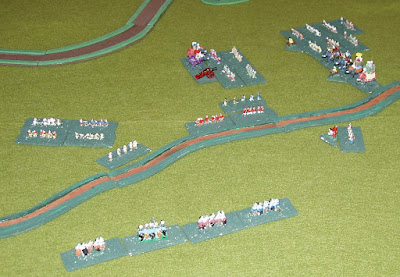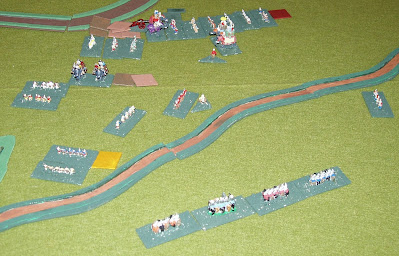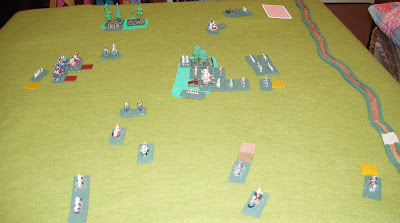Well, the scores on the doors indicate 24 wargames played in 2024, which I do not think is a bad score. Such is the nature of the blog that I suppose they might be described as ‘eclectic’ in terms of periods. I have ranged from a couple of re-fights of Marathon (the Greeks won both) through to the couple of test scenarios I have tried for the 1635 skirmish campaign.
There were a few tries at an ECW scenario, the Bridge at Muchado, which were nice games but which were supposed to spark a campaign, which did not take to flame. I seem to have a bit of a block at the moment when it comes to the Wars of the Three Kingdoms. I am not sure why. On the other hand, I transferred the scenario to the Ancient Spanish and that was a most enjoyable action, with skirmishers ebbing and flowing across the stream.
In terms of ongoing campaigns, at the start of the year, the Siena campaign was ongoing. I was very successful as the Sienese commander until the French invaded. I lost the battle badly and decided that retirement to a roomy French Château with its own vineyard with a decent pension was preferable to carrying on. That, and the fact that I had more or less run out of army.
The Siena campaign mechanics were based on some older ones I created years ago for the rise of the Aztecs in Central Mexico. The transfer worked rather well, I felt, although the Italian Wars version is still on scribbled notes. It was revived again for the current and ongoing Burma 1530 campaign, this time with randomised troop selection and, of course, added elephants. It is nice to have a sensible sequence of games featuring elephants; I feel they do add rather a lot to a wargame table, even when they are 6 mm scale and painted by me. Still, I have properly written up the campaign rules this time, which means that they might see the light of day somewhere, somewhen.
The other things that happened on the wargaming front were the painting of a bunch of civilians for the 1635 France games and the making of a load of 20 mm card buildings for the same purpose. I have used them a couple of times, which was rather gratifying, but I really should get on with the campaign, which is a cross between skirmish and role-playing levels. Too much detail bogs play down, so I have evolved a method of simply noting the NPCs who join in the action and rolling them up as needed. Something fairly quick is needed, and, as it is a solo campaign, nothing that will bog it down in minutiae. In my professional life I have had to deal with minutiae, and I am not entirely sure I want to in my hobby time.
The only other painting that took place was of Far Eastern ships. I was very pleased to discover that Tumbling Dice produced a 1:2400th range of these – Korean, Japanese, and Chinese. I have been wondering why no-one created them in a usable miniature scale for over 20 years, and suddenly, there they are. Anyway, I am not good a painting and even worse at modelling, but eventually the ships were painted, with masts stuck more or less firmly in place. I also read a book about the Japanese invasion of Korea at the end of the Sixteenth Century, and very good it was too, although the events, let alone the place names, are somewhat complex and confusing. Still, a minor campaign was started once I found a suitable province-based map of the peninsular. This is a couple of wargames in, but unfortunately in planning I omitted a trigger point for the Chinese intervention, so it needs a bit more work. We shall see. I could also do, probably, with some more Japanese cavalry.
A slight hiccough this year has been the disruption of my dreams of expanding some of my more obscure armies, due to Irregular ceasing production of their 6 mm figures. This is a shame, although with the vast ranges they did have it is probably understandable. Mind you, every time I think about expanding an army, or starting a new period, part of me starts shouting ‘But you hate painting’, and that is still true. On the other hand, I still have a 28 mm King without a Queen, so I might have to rectify that at some point.
On that point, of course, I failed to get to any shows where I might have rectified said problem. I was due to go to one, but I woke up in the morning fired up for it (sort of) looked out of the window and saw …. nothing. Really. The snow was blowing horizontally against the windows of the windward portions of the house. When it eased off a bit I observed the black ice forming on the lane and decided that it was too dangerous to set off. Actually, the Estimable Mrs P inquired as to whether I really thought it was safe, and I had to confess that it was not. It cost me, as I promised to buy her a book about German vehicles in the Spanish Civil War if she did not make it to the talk at the show, and she did not.
Reading has rather slowed down. I do have some history books on the go, of course, but that has been interrupted by doing some philosophy courses, at least in the autumn. These were very worthwhile but surprisingly hard work. After all, I paid to do them, so I do need to do the reading to take full advantage. That, of course, eats into time for reading other stuff, and thus my banks of history, wargaming for the use of, are a bit run down at present. I can, however, bore for England on Simone Weil, ontology and ethics.
So, a brief run-through (rather belatedly, I confess) of activities in 2024. Where to in 2025? I shall, I dare say, have something to say about that fairly soon. Either that, or we shall all have to sit back and see what happens.








